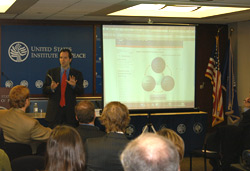The International Network to Promote the Rule of Law (INPROL) Launch Event
About INPROL
The International Network to Promote the Rule of Law (INPROL) is a consortium of practitioners joined together to develop the human capacity and intellectual resources required to promote the rule of law in countries transitioning from war to peace. INPROL seeks to turn "lessons learned" from previous experience about promoting the rule of law into lessons that are actually applied. As an internet-based network, INPROL provides those serving in the field the ability to exchange information with other experienced practitioners as well as access to relevant documents, best practices, and related materials. The network seeks to foster a holistic and integrated approach to the rule of law by incorporating all professional communities involved, including, but not limited to, judges, prosecutors, defense attorneys, senior police officials, stability police commanders, corrections officials, legal advisors and monitors, and judicial administrators.
INPROL Membership
INPROL seeks to build a diverse international membership reaching across organizations, countries, and disciplines. Membership in INPROL is open to those who are currently serving in a rule of law related capacity or those who have previously done so.
Archived Audio
To listen to audio or to view video, please click on the links provided below. You also can right click on the links and choose "Save Target As" or "Download Linked File." This will save the file to your computer and then allow you to play it in your media player directly. More Audio Help.
- Listen to the audio from this event.
2:57:59 - 33.6MB





